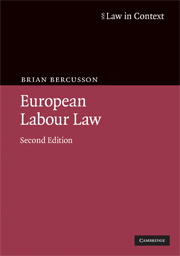Book contents
- Frontmatter
- Contents
- Preface
- Section I Labour law and Europe
- 1 European labour law and the social dimension of the European Union
- 2 EU labour law and the UK
- 3 The conceptualisation of European labour law
- 4 Shifting strategies 1951–1986: ECSC, EEC, harmonisation, financial instruments, qualified majority voting
- 5 The strategy of European social dialogue
- 6 The European Employment Strategy, the open method of coordination and the ‘Lisbon Strategy’
- 7 The strategy of fundamental rights: the EU Charter of Nice 2000 and a ‘constitutional’ strategy
- Section II The structure of European labour law
- Section III The futures of European labour law
- Index
- References
2 - EU labour law and the UK
from Section I - Labour law and Europe
Published online by Cambridge University Press: 05 June 2012
- Frontmatter
- Contents
- Preface
- Section I Labour law and Europe
- 1 European labour law and the social dimension of the European Union
- 2 EU labour law and the UK
- 3 The conceptualisation of European labour law
- 4 Shifting strategies 1951–1986: ECSC, EEC, harmonisation, financial instruments, qualified majority voting
- 5 The strategy of European social dialogue
- 6 The European Employment Strategy, the open method of coordination and the ‘Lisbon Strategy’
- 7 The strategy of fundamental rights: the EU Charter of Nice 2000 and a ‘constitutional’ strategy
- Section II The structure of European labour law
- Section III The futures of European labour law
- Index
- References
Summary
Introduction: the ‘British problem’
The United Kingdom occupies a singular position in EU labour law: over the last twenty-eight of its thirty-five years (80 per cent) as a Member State of the EU, British governments have provided the most consistent and effective opposition to the extension of rights for workers and trade unions in EU law. The Conservative government elected in May 1979, first under the leadership of Margaret Thatcher and then John Major, pursued a specific social and labour policy with remarkable consistency and determination throughout that period. The New Labour government elected in May 1997 was committed to a vision of labour law which, in the words of its leader, Tony Blair, ‘would leave British law the most restrictive on trade unions in the western world’.
The consequences of this continuous opposition to labour regulation for the UK's relationship to European labour law – both the impact of EC law on domestic labour law, and also the impact of the social and labour policies of UK governments on the development of EC labour law – have been unmistakable. The mutual impact can be described in terms of a reversal of policy flow: up to 1979, UK domestic labour law policy was influenced in important ways by EC labour law; since 1979, it is EU labour and social policy which has been heavily influenced by domestic UK social and labour policies.
- Type
- Chapter
- Information
- European Labour Law , pp. 42 - 77Publisher: Cambridge University PressPrint publication year: 2009



